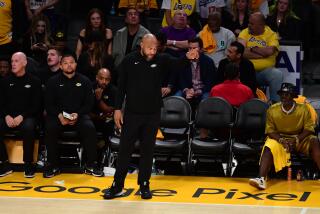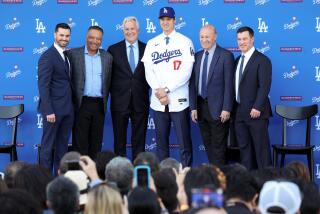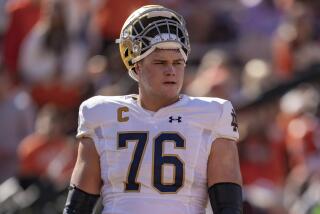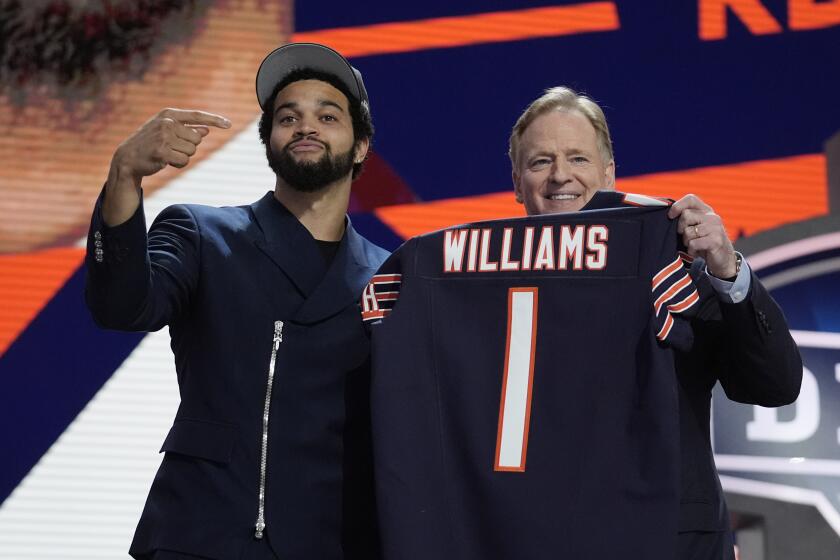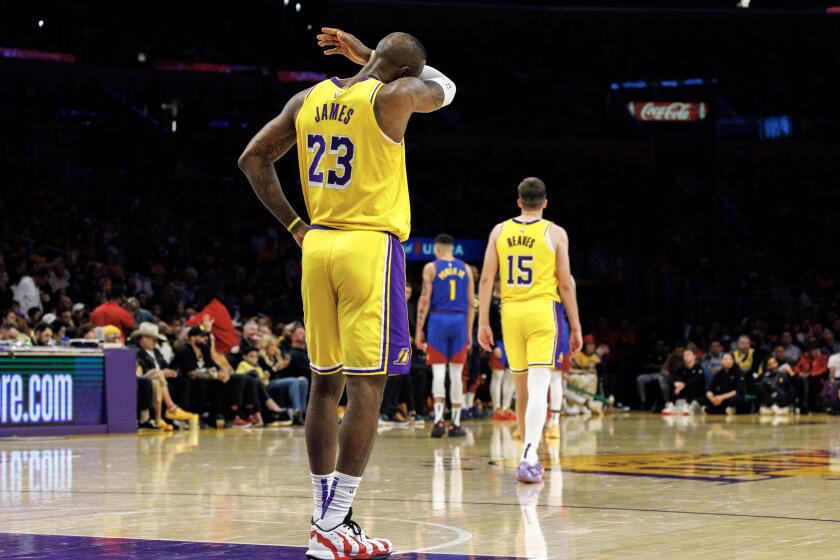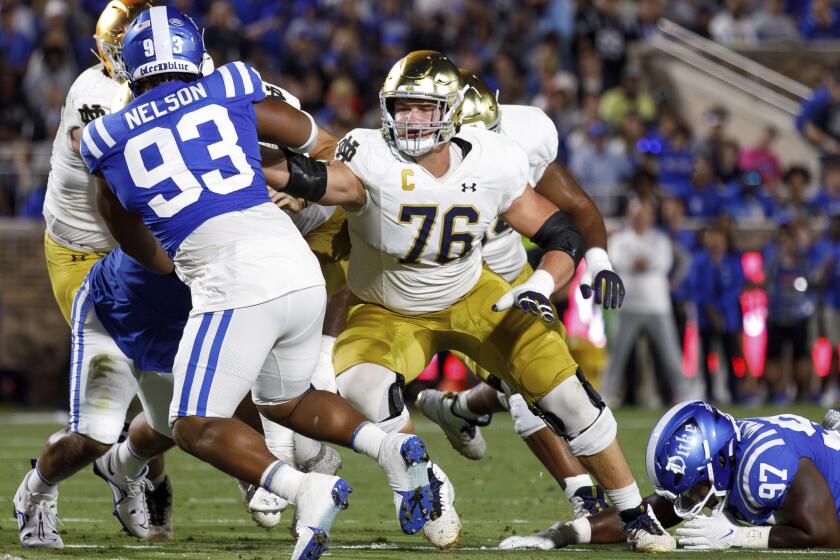Washington Offers a Standout at Running Back, Too
Statistically, Washington tailback Greg Lewis would seem more important to the Huskies’ ground game than Emmitt Smith, his Florida counterpart and rival in Saturday’s Freedom Bowl, is to the Gators’.
Discuss Smith, twice a top-10 finisher in voting for the Heisman Trophy, in the same breath as Lewis, who wasn’t even sure of a starting spot in the Huskies’ revamped offense until last spring?
Actually, it’s not all that outlandish.
Smith, an All-American running back, gained 1,599 yards this season, third-highest in the NCAA. Lewis, who had only 145 yards rushing as a freshman and 154 as a sophomore, had 1,100 yards this season. He became only the fourth Husky to surpass 1,000 yards in a season and the first to do it since 1978.
Lewis’ performance becomes especially noteworthy when the calculators come out: While Smith’s 1,599 yards was 59.4% of Florida’s team rushing total of 2,693; Lewis’ 1,100 yards was 79.5% of Washington’s ground gains.
That’s not to say that Lewis is a better player than Smith, only that he’s a key and versatile player on a team that finished 7-4.
“Those are just numbers,” Lewis said Wednesday, smiling at the favorable statistical comparison with Smith. “Emmitt Smith is a great back. He’s a Heisman Trophy candidate every year.”
A lack of self-confidence in part stopped Lewis, a 5-foot-11, 202-pound Seattle native, from reaching his potential in his first two years at Washington. Lewis’ breakthrough came in spring practice after the departure of tailback Vince Weathersby, who ranks second on the Huskies’ all-time rushing list with 2,653 yards. Lewis blossomed and fought off would-be freshman challenger Eugene Harris to keep his job.
Time in the weight room and on the track helped him cut his 40-yard dash time from 4.5 seconds to 4.4, which gave him the quickness he needed to avoid weekly poundings on the ground.
His pass-catching ability also was enhanced. Adapting to the Huskies’ switch to a pass-dominated offense with a one-back set, Lewis caught 45 passes for 350 yards, by far his best receiving numbers.
“His attitude has always been great,” Husky Coach Don James said, “but at this time last year, if you would have polled the coaches, we would not have said Greg Lewis would be our starting tailback. He really worked hard to get quicker and stronger. If we’d stayed with the I (formation), he’d have done just as well. He can catch the football and he’s got good hands. He’s also a good blocker and he’s our most improved player. He’s just a nice young guy.”
And now a nice young guy with a sense of purpose.
“I had a change in attitude,” Lewis said. “The last two years, VW (Weathersby) was there, and I’d think, ‘Well, he’s going to start, so I don’t have to work hard. They’re not going to be counting on me if they have him.’ Then he graduated, and I knew this was my chance. My whole attitude was different and I began to believe in myself. The running backs coach, Matt Simon, was behind me, and he let me know the coaches believed in me, and that they’d seen me developing.”
His development took a detour after just one season. Although he averaged 6.6 yards a carry while playing occasionally as a freshman, he averaged only 3.9 yards the next season and was regarded as a disappointment.
“I had some injuries my sophomore year and when I came back, I was sharing playing time,” said Lewis, who hurt his hip in a car accident but didn’t miss any games. “I got down about that and I kind of let myself fade into the background.”
He rushed for 100 yards or more five times this season, including a season-high 165 yards against Purdue on Sept. 16. The Huskies were 5-0 when Lewis ran for 100 or more yards.
Lewis caught at least one pass in every game, a distinction he shared with split end Andre Riley, tight end Bill Ames and flanker Orlando McKay. Not bad for someone who was recruited as much for his defensive skills as for his offensive talents.
“I like to catch the ball,” he said. “God gave me the ability and I’ve got real big hands. But I’d still rather run the ball. . . . I set a goal of 1,000 yards this season because I knew if I could get 1,000, our offense would have a chance to be successful. If our running game is going, that gets our passing game going.
“Our offense is based on balance. We have to have our running game for our passing game to work. The passing game has to spread them out and get them to play the pass, so then we can surprise them with the run. We have to get both ends going to be successful.”
The Huskies closed the season with a 5-1 rush, which lifted them to a second-place tie in the Pacific 10.
“We didn’t have a bad year. We had a lot of new personnel and an entirely new offense, and that took some adjusting,” Lewis said. “A lot of people counted us out. Some people predicted us as low as eighth in the Pac-10, and a lot of people said we’d be in the second division. I know the individual people I work with have all improved. I don’t know how other people are going to judge us.”
A Freedom Bowl victory over the Gators would make those judgments kinder.
“We know they have a great defense and a lot of team speed,” Lewis said. “They fly to the ball and they take a lot of pride in stopping the running game (Florida ranked fifth in the NCAA in passing defense, yielding 88.6 yards a game), so we’re basically going to have to have our passing game working and then try to hit them with some running.
“Winning would send the seniors out on a big note, and we’d have a pretty good shot at getting a top-20 ranking, which we were nowhere near at the beginning of the season. It would be good for next year, too. We’re graduating only seven starters and, if we win, that would be a big boost for everyone who’s coming back.
“Besides,” he added, “it would be a lot more fun than losing.”
More to Read
Get our high school sports newsletter
Prep Rally is devoted to the SoCal high school sports experience, bringing you scores, stories and a behind-the-scenes look at what makes prep sports so popular.
You may occasionally receive promotional content from the Los Angeles Times.
